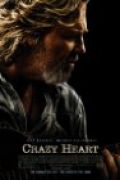
Directed by
Scott Cooper
111 minutes
Rated M
Reviewed by
Emma Flanagan

Crazy Heart
Synopsis: 57 year old Bad Blake (Jeff Bridges) lives up to his stage name. He is bad at marriages (four failures), managing his finances (he has $10 to his name) and looking after himself (a doctor gives him a shopping list of his health issues). One day, in yet another dive, he meets Jean (Maggie Gyllenhaal), a journalist trying to get a break, who is looking for the real man behind the faded legend. Will Jean be the one to help him change a lifetime of bad living?
Crazy Heart is a film that could have gone so wrong in so many ways, but which has ended up so right. When I saw the Golden Globe go to Bridges for his performance as Bad Blake, I wondered would this film be a replay of the sublime Horton Foote-scribed Tender Mercies (1983), or would it be a Hollywoodised “man finally sees the light with the help of a good woman, who Stands By Her Man” homily? This latter option seemed particularly likely, given that Crazy Heart revolves around past-his-prime Blake, the archetypal hard-drinking, womanising, shiftless country music singer.
At the opening of the story there is a quote from the late legendary Nashville writer Harlan Howard, who claimed that “Country music is three chords and the truth”. This could have heralded yet another sentimental ode to heroic transformation, but it actually works as the guiding light and the central theme of the film. In so doing it incidentally reflects Howard’s lifetime goal of giving to the younger generation following on behind him, which is what Blake does for his much younger, estranged protégé, Tommy Sweet.
Southerner Scott Cooper has adapted Thomas Cobbs’ book of the same name and also directed and produced Crazy Heart, which shows a man down on his luck by his own devices. You may wonder what on earth would be appealing about a fat, chain-smoking drunk, whose last Number One hit is a fading memory, especially as the film does not shy away from the downside of bad health. Watching Blake throwing up and seeing his bloated bare stomach on the large screen are not pretty sights. But Blake has never missed a show and, however much he bleats to his manager about the calibre of the venue he plays, he has no intention of missing one. And there is another quality of his which shines out – he is fundamentally honest. He doesn’t hide any of his sins, and he never pretends that his one night stands mean more to him than that. But when he meets Jean, she gets under his skin in a way that doesn’t appear to have happened to him before.
Bridges sings many of the tunes and appears to be doing them live. He does a sensational job. The quality of the music is a key to the success of this film. Co-penned by T Bone Burnett and Ryan Bingham, the song “Weary Kind” won a Golden Globe. The supporting cast is excellent and performances by Gyllenhaal, James Keane as Blake’s slimy manager and Colin Farrell (in a surprise turn as Tommy Sweet) are all spot-on. I just hope that Bridges and Robert Duvall, who plays Blake’s best friend, Wayne, really are good friends. They certainly play off each other well during the film with Duvall, (who won an Oscar playing a broken down country singer in the Bruce Beresford-directed Tender Mercies) managing despite,.or perhaps because of, his less than brilliant singing to get in the last word.

Want more about this film?


Want something different?




